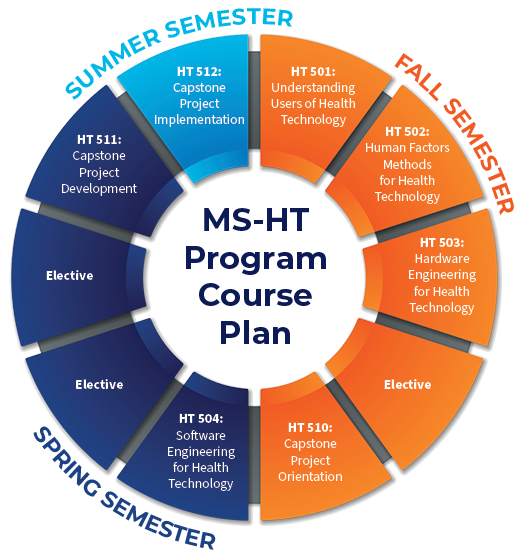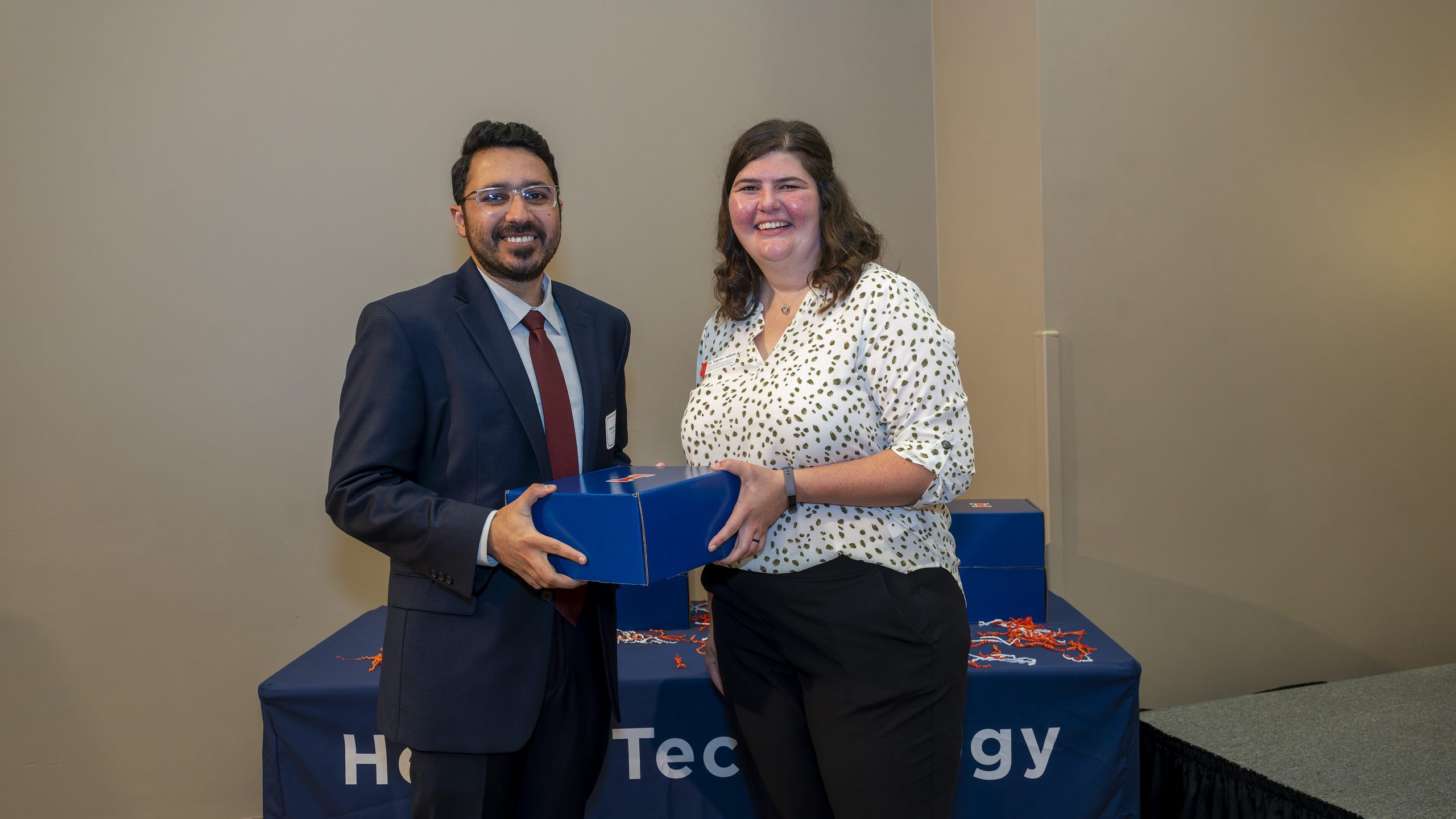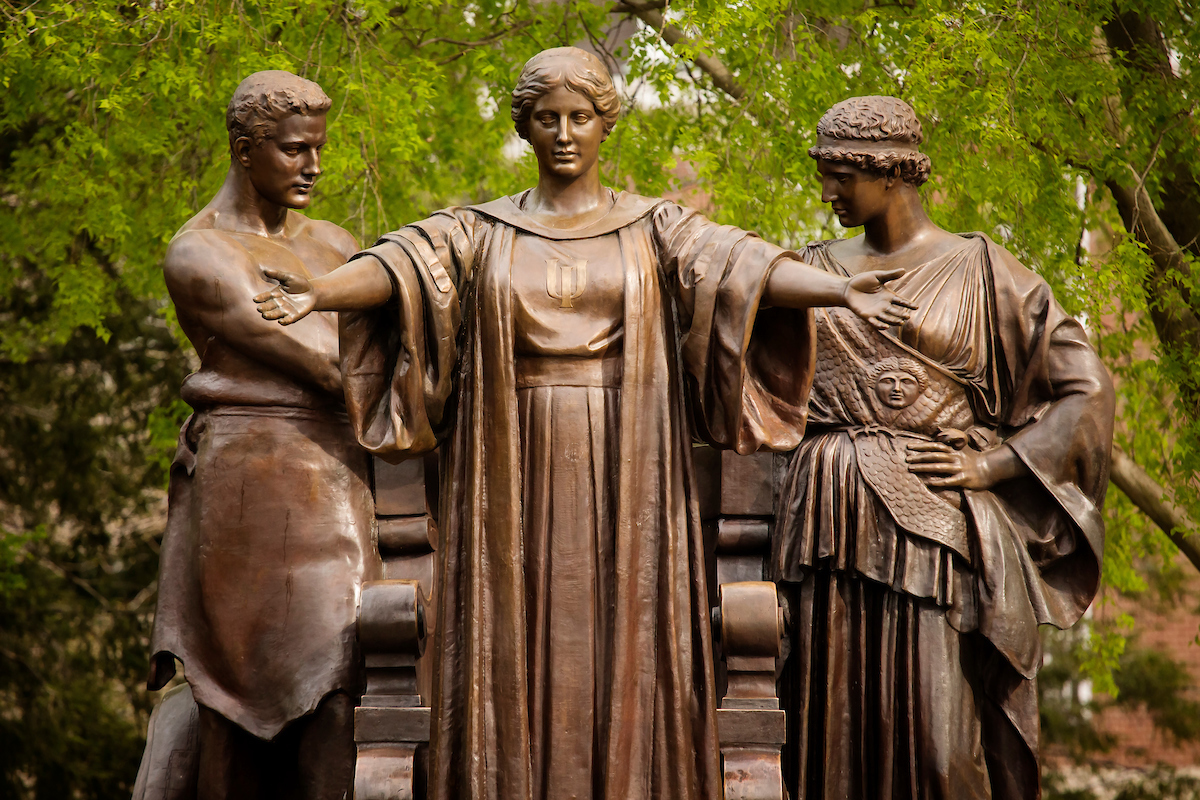Master of Science in Health Technology
The College of Applied Health Sciences, in collaboration with The Grainger College of Engineering, offers a one-year, STEM-designated Master of Science degree centered in health and human factors.
Health Technology
What? Any technology used in the context of healthcare such as smart-home technology, social and assistive robots, digital home assistants, social engagement tools, wearables, and applications to support individuals and their care.
Why? There is a rapidly growing need for well-trained professionals with skills in software application, hardware engineering, human factors, and user-centered design to create innovative health technologies.
Who? YOU! We welcome all applicants to apply to our program! Undergraduate majors and minors of students range from psychology, business, industrial engineering, community health, exercise science, computer science, information sciences, and more. All experience levels in health and programming are invited to apply.
Schedule An Advising Appointment
Schedule a virtual time to talk with Dr. Katelyn Talbott, Assistant Director of the Health Technology Education Program! During this one-on-one time, we encourage you to ask questions, share your goals, and learn how this program can further develop your skills in health technology.
Choose Health Tech
Program Highlights
- Core courses strengthen skills in human factors and engineering concepts applied to health technology
- Electives tailored to individual student interests
- One-year intensive, 36-credit program
- In-person courses
- Small cohorts
- Scholarships/fellowship opportunities
- Capstone Project pairs students with industry/academic/community partners
The Capstone Project
A highlight of the MS in Health Technology program is that all students participate in a year-long capstone project. This project matches students with Capstone Project Partners in industry, government, community-based organizations, and academia.
Previous Capstone Projects
- Wearable devices to link seniors and family members
- Model accelerometry data related to frailty, disability, falls
- Expert system for diagnosing falls risk in the home
- Validation of use cases for digital health technology
- Software analytics for prediction of anxiety and depression
- Digital home assistant tool for older adults’ legacies
- Mobile application to support care transitions
- Implementing, evaluating, and optimizing fall prevention technologies in senior living
- Wearable-based intelligent app for personalized at-home exercise training in adults with Multiple Sclerosis
- Affective and physiological responses to task guidance via a voice assistant
- Co-design and optimization of a web portal for identifying adults in need of exercise support
- Designing for disabilities: The human factors of battery technology for power assist devices
- Voice Vision VItals (VVV): Data collection and treatment tracing for neuropsychiatric and voice disorders
- IMPACT-Inclusion of Minority Patients in ADRD Clinical Trials through care partner engagement
- Development and validation of a fall detection device for older adults who use wheelchairs or scooters
- Centering the patient user experience for a digital health tool
- Care Partner Medication Education, Decision Support, Reminding and Monitoring (CaP-MedSRem) system
- Building health communities through park equity modeling
- User interface design for a soft and dexterous service robot to support healthcare of older adults at home
- Smartphone apps for tinnitus and hearing loss

The 36-credit hour program consists of 4 foundational courses, 3 Capstone Project courses, and 3 electives.
View full Program Course Plan.

Scholarships & Tuition

Application Information
Careers of MS-HT Graduates
Job Titles
Associate Human Factors Engineer
Data Engineering
Product Coordinator
Research Associate
UX Researcher
Human Factors Associate
Fellow
Associate Product Manager
Innovations and Operations Analyst
UI/UX Designer
Companies
Motorola
OSF Healthcare
Innovation Hub
Emergo by UL
Virtusense
Medline
The National Academies of Sciences,
Engineering, and Medicine
University of Illinois Urbana-Champaign
Somatus
Curo
Bold Insight
Design Science
Choose Illinois
Our MS in Health Technology is a one-of-a-kind program, centered in health, that meets this need through classwork and experiential learning opportunities in software/hardware engineering, human factors, and user-centered design.
Students in the MS-HT program are supported throughout their degree. This support comes from various professionals across the department and campus. Students can expect support through academic advising, faculty mentoring, career advising, and professional mentorship.

University of Illinois Urbana-Champaign
Research. Teaching. Public Engagement.

The Graduate College
Supporting Illinois graduate students.

Campus
Explore the heart of CU in central campus.

Living in Champaign-Urbana
Explore our micro-urban community.
Designing for Health